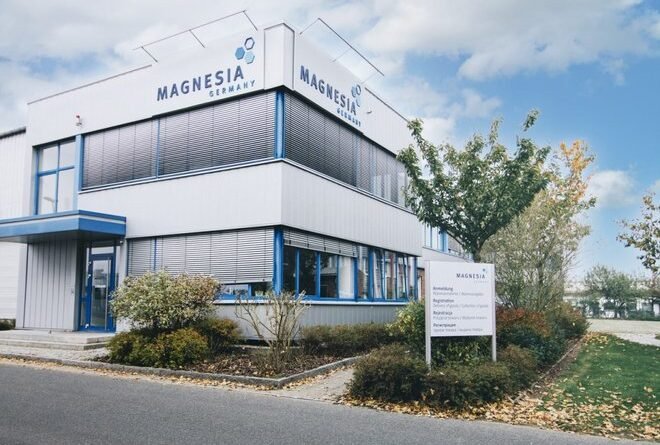Hidden Champion From Germany Plays Significant Role In The Minerals Market
Magnesia is an international distributor of mineral compounds. Its headquarters are in Lüneburg, approximately 50 kilometres south of Hamburg in northern Germany. Lüneburg has been well-known for its salt deposits in the ground since the Middle Ages.
Magnesia had been founded in 1983 as the successor company re-starting the trade of mineral compounds. Today, company is a team of 50 people, trading more than 15,000 metric tons of mineral compounds across the entire world and making to achieve 30 million in revenue in 2020. Managing Directors Markus Cording and Johann Studtmann explain in an interview what Magnesia’s core business is and what the company is planning for the upcoming years.
What is the secret of the company’s success in the summary of your experience and activities on the market?
Since our early days, we have managed to align our business activities with customer requirements. The key is to generate a real and transparent added value for the supply chain.
And in the case of Magnesia the comprehensive know-how regarding the markets and products, followed by qualification processes of products and suppliers, providing a quick and personal customer service – from the enquiry to the final delivery – is what is valued most. We can leverage experiences and knowledge from the past, have managed to preserve and pass it on to new colleagues and to not only maintain but constantly improve our level of consultancy for our customers. Especially the latter is extremely helpful in a market with lots of suppliers and even more fields of applications. Our sales team becomes part of your sourcing or R&D department. We will find the right compound for you and your application.
And to maintain or even improve this level of consultancy, another important key to success is creating a perfect working environment for our employees. As described above, they are our biggest asset. We are convinced that motivated employees will lead you to achieve your business goals and to succeed in the market.
How would you describe the current position of Magnesia in the domestic and European market?
When R&D or purchasing departments of a variety of industries in Europe need a supplier for mineral compounds, we are the first address to contact. At this point, we are confident enough to say that we are the best distribution partner for Magnesium, Calcium and further mineral compounds for the pharma, cosmetic, food, nutritional and technical sector across Europe. This is the case because of a variety of internal and external factors: We are located centrally within Europe with great logistical links to for example long-distance traffic, rail freight, international cargo port as well as the airport in Hamburg. In analogy to the attribute “made in Germany,” we notice that many customers also value to do “trade with Germany” as it stands for high-quality products, sourcing and process standards. We at MAGNESIA meet this requirement by putting great importance into product and supplier certification. In addition, the products are subject to an extensive entry and qualification process. This extends from the qualification of suppliers and products, through incoming goods inspection, regular laboratory analyzes and LIMS-controlled batch release to individual labelling of the goods. All this sums up in high customer satisfaction rates (>93%; 2019 – 2020 is currently conducted).
Which products/groups of products and services on offer are the most popular among customers, both at home and abroad?
Certainly, we are specifically strong in the products that are already shown in our company name Magnesia. Magnesia is widely used as a synonym for Magnesium oxide which is in fact also our strongest product. For example, when we talk about Magnesium oxide at MAGNESIA, we offer more than 50 different grades with different product specifications. All these different grades are the basis to be used in different fields of industrial applications for a broad variety of industry segments. Not only the oxides but all types of compounds are carefully selected from the best manufacturers around the globe in order to present a broad variety of possible products to our customers. This shows our understanding of knowing markets and knowing customers’ demands.
What investments has Magnesia made in recent months to increase the company’s production capacity and its competitiveness?
As already stated above, our employees are the key to our success. Therefore, we mainly invest in good staff and professionals for different specialist departments of Magnesia. Even throughout 2020 – which was seriously affected by the pandemic –, we have increased our workforce by another 20%. We are more than confident that this will be followed by an increase in sales and revenues this year.
In the future, we will focus on expanding our product portfolio with “Magnesia Exclusive” products that offer special specifications in order to meet special customers’ requirements. In 2020, we have already started with this direction and added the newly founded business unit Lightweight Fillers to our range of products. We aim to become Europe’s specialist for this type of products in the next 3-5 years.
Another focus is to push our digital activities. Digital transformation in traditional distribution is a daily challenge that we are willing to accept and to consequently follow in every situation. In this context, we are in the developing phase of a white label product range. This new business model extends our current value chain and makes us become a digital hub. By this strategy, we can offer new types of customers off-the-shelf products that they can immediately sell in their existing distribution channels.
What factors distinguish the MAGNESIA offer from the competition?
In the mineral compounds business, we are used to every new customer requirements and special requests. To provide the ideal consultancy for our customers we need to be specialists in their fields of application. We have already achieved this, by implementing individual business units per industry segment, i.e. pharma and cosmetics, nutritional and health supplements, food and international business, technical magnesia and the above mentioned lightweight fillers-unit. Due to this structure, we are able to understand the needs, to source the right products in the market and to provide fast and reliable solutions for our customers. Also, one needs to understand that for example within the pharmaceutical, cosmetics or food industry, we are operating in highly regulated markets. Seamless regulatory and documentary support is a part of our services, too. Furthermore, we do not rest on the status quo but always challenge ourselves and our way of working. Innovation is one key concept of Magnesia.
Directions of the company’s development: which market has the most potential for growth and is there a specific product you see leading this growth?
The pandemic has shown that our society is vulnerable and individual health has gained much more attention. People understand the need for healthy food and healthy living. Magnesia’s range of products being suitable for healthy food supplements matches this current trend. We are committed to supporting consumers’ health and each day we receive the response from the markets and our customers that this area is having a bright future.
Magnesia’s strategy for the coming years?
Our strategy in the next years will face digitalization as well as innovative solutions in the current traditional market and exclusive partnership for new products in the pharmaceutical and nutraceutical segments. Especially the COVID-19 pandemic has shown us that digitalization is imperative to this still relatively traditional industry. In addition, we need to take responsibility for our natural environment. Sustainability in our daily actions, in our selection of products as well as suppliers, and in our daily work will become even more important. Therefore, part of our strategy is also to reduce our CO2 footprint significantly within the course of three years.




